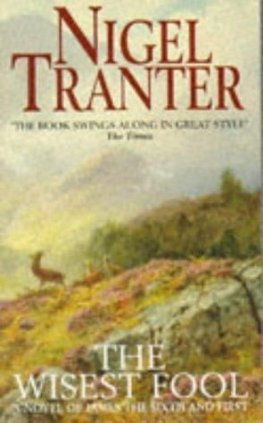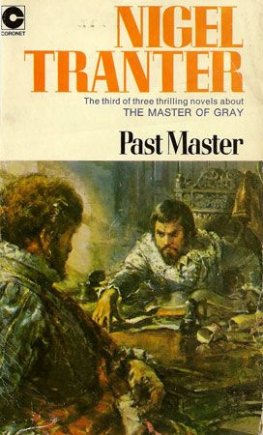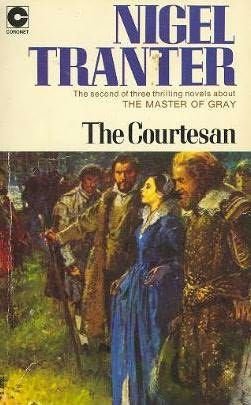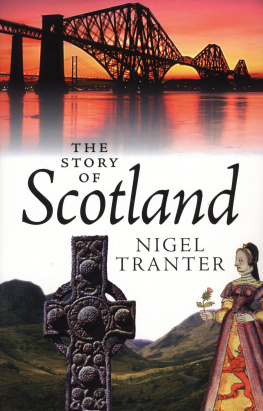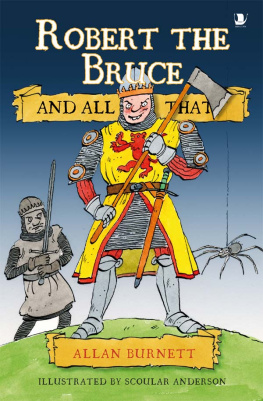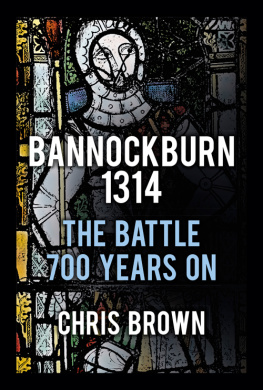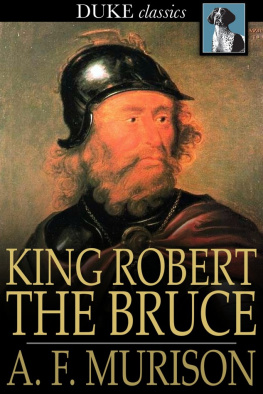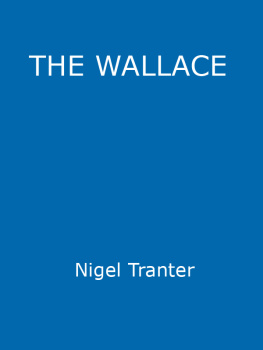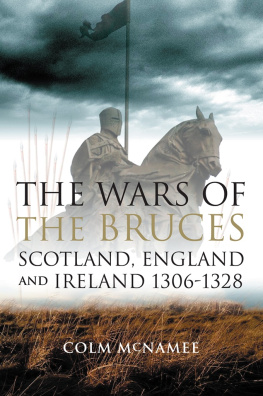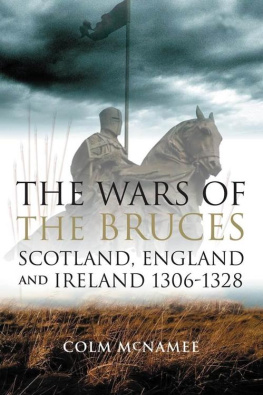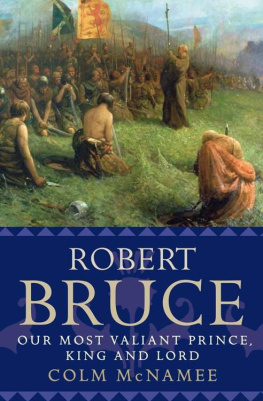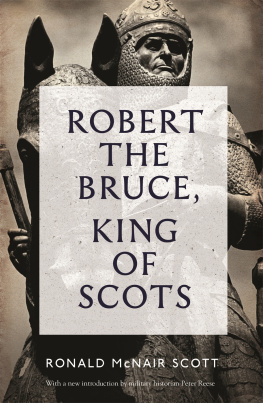THE PRICE OF THE KINGS PEACE
THE BRUCE TRILOGY
Book Three
Nigel Tranter
Book Three
THE PRICE OF THE KINGS PEACE
The Price of the Kings Peace 1971 by Nigel Tranter.
First published in Great Britain 1971 by Hodder and Stoughton Ltd.
For
ANDREW HADDON
who, too late, pointed out to me that the English monarchs only became majestic from Henry the Eighths time, an eminence to which their merely gracious Scots counterparts never aspired.
PRINCIPAL CHARACTERS
In Order of Appearance
Robert Bruce, King of Scots; Three weeks after Bannockburn.
James Douglas: The Good Sir James, Lord of Douglas.
Friend of Bruce.
Elizabeth de Burgh, the Queen: Wife of Robert the First, and daughter of the Earl of Ulster.
Gilbert Hay: Lord of Enroll, High Constable of Scotland.
Friend of Bruce.
Neil Campbell of Lochawe: Chief of Clan Campbell.
Mary Bruce: third sister of the King.
Hugh Ross: elder son of the Earl of Ross.
Matilda Bruce: youngest sister of the King.
Thomas Randolph, Earl of Moray: the Kings nephew by a half-sister.
Edward Bruce, Earl of Carrick: the Kings only surviving brother.
Angus Og Macdonald: Lord of the Isles and self-styled Prince. Christina MacRuarie, Lady of Garmoran: Chieftainess of branch of Clan Donald; widow of brother of late Earl of Mar.
Humphrey de Bohun, Earl of Hereford: Lord High Constable of England.
William Irvine of Drum: the Kings Armour-bearer.
Christian Bruce: the Kings second sister, widow of Earl of Mar, and of Sir Christopher Seton.
Marjory Bruce: the Kings daughter, by Isobel of Mar.
Isabel Mac Duff Countess of Buchan: sister of the Earl of life, and widow of the Comyn Earl of Buchan.
liam Lamberton, Bishop of St. Andrews : Primate. Friend of Bruce.
Malcolm, Earl of Lennox: Great Celtic noble, and friend of Bruce.
liam, Earl of Ross: Chief of Clan Ross, betrayer of the Queen. Bernard
de Lorron, Abbot of Arbroath: Chancellor of Scotland. Sir Alexander
Comyn: brother of Buchan, Sheriff of Inverness.
Walter Stewart: 6th Hereditary High Steward of Scotland, the Queens cousin.
Master Robert de Whelpington, Prior of Hexham: prominent English cleric.
Patrick, Earl of Dunbar and March: great Scots noble, formerly on the English side.
Sir Alexander Fraser: High Chamberlain of Scotland.
Sir Robert Fleming: Lord of Biggar; Bruce supporter.
Malcolm MacGregor of Glenorchy: Chief of Clan Alpine.
Sir Robert Boyd of Noddsdale: veteran Bruce supporter.
John MacDougall the Lame, Lord of Lorn: son of the Chief of MacDougall, Lord of Argyll.
Robert Stewart: infant son of Marjory Bruce and Walter Stewart;
to be King Robert the Second.
Sir William de Soulis: Lord of Liddesdale; Hereditary Butler;
friend of Edward Bruce. Sir Colin Campbell: son and heir of Sir Neil.
Stepson of Mary Bruce.
ONeil, King of Tyrone: Irish prince.
MacCarthy, King of Desmond: Irish prince.
Master Adam de Newton: Prior of Berwick.
Sir Alexander Seton: Seneschal of Scotland.
David de Moray, Bishop of Moray: Uncle of patriot, Andrew Moray.
Dewar of the Coigreach: Hereditary Keeper of St. Fillans staff.
Dewar of the Main: Hereditary Keeper of St. Fillans left arm bone.
Maurice, Abbot of Inchaffray: friend of Bruce, later Bishop of
Aberdeen.
Sir David de Brechm: nephew of Bruce by another stepsister.
Sir Ingram de Umfraville: uncle of Earl of Angus: onetime Guardian.
John of Brittany, Earl of Richmond: English commander;
nephew of Edward the First.
Sieur Henri de Sully: Grand Butler of France.
Sir Andrew Harcla, Earl of Carlisle: English commander.
David Bruce: infant son of the King. Later King David the Second.
Sir Henry Percy, Lord of Northumberland: son of Bruces late foe, of
same name.
PART ONE
Chapter One
Robert Bruce chewed at his lip-partly to hold back hot words.
Already he had all but bitten the head off not only this wretched Englishman, but off his own good friends James Douglas and Gilbert Hay. Which was quite uncalled for and deplorable, he well knew. He kicked gold-spurred heels into his magnificent horses flanks-there was a plethora of both magnificent horses and golden spurs in Scotland, since Bannockburn -to urge his mount a little way forward, ahead of his companions, where at least he might be spared their inanities.
And immediately, of course, the others spurred after him.
That ridge ahead, Sire, Sir Roger Northburgh said, gesturing.
It will make a good viewpoint. We may see something from there.
Good God, man-think you I need to be told that! the King burst out.
Need I schooling from you that ridges provide viewpoints?
Abashed, offended, the Englishman closed his lips tightly and stared straight ahead of him at the rolling Cumbrian foothill landscape, southwards.
Sir James, Lord of Douglas, thirty-one and looking younger, with the dark, almost gentle good looks which so strikingly belied his reputation, coughed.
Shall we ride ahead, Your Grace? Prospect ?
No! That was a bark, vehement as it was unkind. Bruce kicked his horse again, from a fast trot to a canter. And promptly, inevitably, the ivory-headed if splendidly dressed group of his close companions did the same, to keep up, unable to understand when a man desired to be alone with his thoughts. Even the King of Scots was entitled to that, on occasion, was he not?
Behind them, at a short distance, the heavily armed and armoured force of some 200 knights and men-at-arms urged their more burdened mounts to maintain approximately the same position, and the entire brilliant company pounded and clanked its way up the long tussocky whin-dotted brae side of Banks Fell, which flanked the fertile Vale of Irthing in North Cumberland. It was almost two years since Bruce had last climbed this ridge, and with a sword in his hand. Gibbie Hay, Lord High Constable of Scotland, had been there too, though Jamie Douglas, as Warden of the West and Middle Marches, had been otherwise engaged.
On the gentle crest of the hill-although it was not what the Scots would call a hill, at all-the King reined up behind the same scatter of wind-blown, stunted ash trees which had shielded them from observation last time. There was no need for such hiding today-but old habits died hard, and this was the automatic reaction of that man on any skyline. He peered down into the fair wide dale beyond, narrow-eyed.
There they are! Northburgh exclaimed, pointing.
Down by the river. Beyond that farmstead, this side of the Roman wall
I have eyes, sir, the King snapped. A pulse was throbbing where his hard lean jaw-line met his temple.
It was absurd, of course, but the warrior King of Scots was nervous. The veteran of seventeen long years of savage war; the leader of more forlorn hopes than he, or any man, could count; the man whom Christendom had called its second-greatest knight, and now was calling its first; the victor of Bannockburn but three weeks previously-this paladin was nervous, agitated, as any callow youth, and, aware of it, irritable, despising himself. Yet, nevertheless, that throbbing pulse was beating out a very different tattoo in his mind and heart, a fierce exultation such as he had never known at Bannockburn or before.
Sire-the trumpeter? Hay suggested.
A nourish? They are little more than a mile away. They would hear No! No trumpeting. Think you we are bairns at play?
I will go down, Sire. To prepare them, Northburgh said.
To acquaint them of your royal presence
You will not, sir. You, nor any. I go alone.
But, Your Majesty-it is not fitting. And these are my people.
Next page


